#And also Telemachus didn’t go to war and was fighting while Odysseus was far away
Explore tagged Tumblr posts
Text
Countdown to the Ithaca Saga: 4 Days!!!
The name Telemachus means “fighting from afar”!
#I might have used this fact in a previous saga countdown#But I feel like mentioning it again :)#Cause Odysseus fought with a bow#And also Telemachus didn’t go to war and was fighting while Odysseus was far away#Epic the musical#epic the Ithaca saga#ithaca saga countdown
246 notes
·
View notes
Text
So right now I’m stuck between two headcanons, and I’m going to need some help picking a favorite.
(Warning: insanely long post filled with Geeking and Greeking out, with lots of references to mythology)
Headcanon One: Annabeth is Penelope (from the Odyssey)
Honestly, I’ve lived for years with the opinion that Annabeth is a first generation soul, but I’ve come to the recent conclusion that, if she were reborn, the only acceptable soul for her would be Penelope’s.
(There are some good arguments to be made for her being Odysseus, but I don’t like that theory, largely because Odysseus is a grade A dick—which we’ll get into later, don’t worry—and that Penelope totally deserved better, which I think Annabeth gets through Percy, among other things.)
Now some of you might be saying, ‘yeah, I get it. Penelope is a badass who totally tricked all of those idiot suitors. But she also spent all of that time crying. And not fighting back. That just doesn’t sound like Annabeth to me.’
Let me remind you: Odysseus was gone for twenty years. He took all of the fighting men with him. Which meant there was no one at home to raise the local boys into civilized Greeks who respected women, and there were also no respectable men to speak up for Odysseus’ family. Telemachus was a baby when Odysseus sailed off to war, and he didn’t have anyone to train him like his dad had. No hunting wild boars and getting insane scars like Odysseus did as a kid. Penelope was raising Telemachus alone, and she couldn’t afford to put up a fuss, or else these immature men-children would have killed her child. In fact, at the beginning of the Odyssey, the suitors are flirting a bit too closely with the idea of murdering Telemachus.
Which brings us to Greek culture at the time, beginning with an anecdote about the Romans (bear with me).
Let’s remember that, in the Homeric cycle + Virgil’s official fanfiction, Rome was born from the remnants of Troy. Aeneas (a son of Venus) fled to Carthage where he married their queen Dido, knocked her up, and then ditched her while he ran off to marry some other chick and build the Roman Empire, all because the gods told him to.
(I’m going somewhere with this. I promise)
Well, the Romans must’ve had some guilt over the shit that Aeneas put Dido through, because they decided to give women marriage rights. By which I mean? You guessed it!
Divorce.
Roman women got to own their own property. And they got to keep it when they married, which meant that they could divorce their husbands and still retain all of their property.
The Greeks? Not so much.
Greek women were educated, mainly for the purpose of running a household and managing finances. But most of them were kept inside the household and away from contact with men. When they did go outside, Greek women had various layers of dress to hide them from prying eyes. Too hot in the summer? Bring a parasol. Wear a giant hat. But those layers stayed on. These women had no ownership of their property. In fact, in many ways they were property. And they had absolutely no rights to divorce.
Now let’s think about the women of the Trojan war.
Note for a moment that Helen and Clytemnestra were Penelope’s cousins. Also note that these three all endured great suffering because they were women trapped in a society that treated them like possessions.
(I mean, the Spartans weren’t like that. But the general conglomerate that we understand to be ‘Ancient Greece’ were. At least, as far as my limited research is concerned)
Helen had a whole hoard of suitors vying for her hand before she married Menelaus (and, I would like to note, that Odysseus was one of those suitors). And they weren’t exactly the most peaceful crowd. After she was married off to Menelaus, there would have been no legal escape. It didn’t matter that Helen loved/lusted-after/whatever-you-want-to-call-it Paris. Legally, she was trapped.
So what did she do?
She ran away with him.
And it turned into a giant bloody mess.
People like to blame Helen for starting a massive war, but you know what? Screw all of those people. Or, better not, like the women of Lysistrata, for gods sakes stop screwing them. Because the real problem here is definitely the fact that these women had absolutely no autonomy.
(I promise this will come back around to Annabeth eventually. I’m just trying to make a point here.)
Clytemnestra? She had an affair while her husband was away because ten years is an awful long time to be alone in a palace where no one takes you seriously because you are a women.
Did you know that she set up this whole chain of Greek towers and posted watchmen at them so they could send fire beacons to let her know that the war was over? And, by the way, those towers were very effective for relaying the message far faster than the soldiers could have sent a person? Far faster than they could sail home?
And everybody else thought that she was totally insane for devising this system. And when she told them that the war was over they didn’t believe her.
Sounds kind of like Cassandra, whom Agamemnon brought home with him as a concubine (right in front of his wife’s salad). And when Cassandra warned him that his wife was going to kill him, he wouldn’t listen to her.
Go read Seneca’s version of the account. His human psychology is incredibly moving, and his portrayal of Clytemnestra is so relatable. She agonizes because she still loves her husband, but she knows that he’ll never forgive her for her affair with Aegisthus. Even though Agamemnon has brought home a concubine war prize. (Oh, and let’s not forget the fact that she’s still rightfully furious that her husband sacrificed their daughter on an alter to the gods so that he could kick up enough wind to sail his fleet to Troy and go retrieve Clytemnestra’s twin sister Helen who didn’t want to be retrieved) In her despair at the ever-growing guilt and frustration, Clytemnestra decides that the only way forward is further into the pit. And, frankly, in the society she’s stuck in, she may be right.
But Penelope is smart. She’s the only one to minimize the damage to the people she loves. She gets a remotely happy ending after twenty years of suffering because she bides her time and plays the game. Penelope is clever, she is quick on her feet, she knows the rules, and she knows exactly how to use them.
Sounding like Annabeth yet?
Now of course, the next question would be: But I thought Penelope loved Odysseus. Why would she ever leave him in the underworld to be reborn if she could be dead with him forever?
As I said before, Odysseus is a dick.
Penelope had to rely on a husband because her autonomy was stripped from her. The only people who could really save her would have been her supposedly-dead husband, or her son. The rest of the men on Ithaca were either too old or were trying to force her into a marriage so that they could be king. A marriage that she had successfully managed to hold off for twenty years, all while managing to ration the palace’s resources (But it’s not like a woman could rule an island, right? Not like she’s intelligent or clever enough for that).
In the Odyssey where we’re reminded over and over again that Athena is a force to be reckoned with, and that Odysseus is only still alive because Athena keeps interceding on his behalf, even down to the very last minute—which Zeus had made illegal, by the way (see my Percy as Achilles post for more information on that), it’s fascinating for us to see Penelope treated so poorly. But look at the way Odysseus treats Athena. She appears to him in person (super illegal) and she has to chew him out because he tries to yell at her and say that she hasn’t helped him at all and that he’s had to do it all by himself.
By himself, huh? Like all those times his pride got his shipmates—his own people over whom he was meant to be a fatherly king—killed? Just like how he sat and cried on Calypso’s island for seven years instead of trying to find a way off? Like how he totally stopped trying to get home when he was hanging out with Circe? And he impregnated her???? (Which isn’t in the Odyssey itself, but is explained later in the Homeric cycle when his and Circe’s bastard son comes back and kills Odysseus and takes Penelope for a wife. Yeah, great ending for Penelope right there. Thanks, Odysseus. Oh, and the sources I looked at indicated that Minerva ordered the marriage. Apparently Athena/Minerva is used to ordering people around about whom they should or should not marry. . . I don’t even want to dig into that . . . ).
And then, when Odysseus does come home, he hides himself from Penelope and decides that he has to test her to see if she’s still faithful to him.
Seriously, like her twenty-years of clever maneuvering and patient suffering weren’t enough for him.
And, yet again I want to remind everyone that Odysseus would have just as eagerly married Helen. That he happened to get lucky that Menelaus was chosen instead, and that Penelope was as intelligent and marvelous as she was. And that she was so faithful to him even though he never seemed to show her the same respect.
Right. Because Penelope is the one who needed to prove herself.
There’s no way that a woman with that level of intelligence would sit in the Underworld, watching dead souls enter who talk about how society is progressing and women have rights now, remembering all the times her husband cheated on her, and how his bastard son killed him and forced her into marriage at the behest of an angsty Roman craft goddess with a personality disorder, and everything else — there’s no way she would have processed all that and not wanted rebirth, in my opinion.
And, if we follow my theory that the rebirth process chooses your future life based on your past development and growth, it’s only logical that Penelope could be a daughter of Athena.
And that Athena would know her soul.
And that Athena would love her as a favorite daughter.
Until Percy Jackson complicates everything.
At this point I would like to reiterate that, in spite of all of Odysseus’ ungrateful sass, he was, like, Athena’s favorite mortal. She blessed him. She loved his clever mind and his snark. She forgave his hubris endlessly because he was her person. She was so proud of that little shit.
I would also like to point out that Poseidon spends most of the Odyssey viciously trying to kill Odysseus. Poseidon knew that Athena liked him. He may have had multiple reasons to target Odysseus, but Athena was no doubt on his mind the whole time. Especially when she kept trying and succeeding at stopping him. She put a lot of work into helping Odysseus triumph over Poseidon.
So you can understand why Athena might be a little extra upset if Penelope/Annabeth is suddenly falling in love with Poseidon’s favorite son.
Who, if you agree with my pre-existing headcanon, also happens to be Achilles.
That would piss Odysseus off so much.
I can imagine Odysseus sneaking his way out of the underworld through the doors of death and managing to stay hidden when the doors were officially closed, successfully using his wily tricks to avoid Thanatos —Possibly with a little help from his favorite goddess. I can picture him hunting down Percy to kill him. Until Annabeth steps in the way and has to tell her ex-husband (wow, is that ever a weird revelation for her) to get lost. At which point he decides he needs to kill her and drag her back to the underworld with him.
There are booby traps everywhere for the next few months. Fancy contraptions. He starts with little gifts at their door—mini ‘trojan horses’—and escalates when he realizes that obviously Penelope is going to know better than to let this Poseidon-son-Achilles-devil-child open a mysterious package that might very well be from her ex.
Odysseus finally catches Percy alone and is all “You stole my wife!”
And Percy has to be like “It’s the 21st century, dude. I’m pretty sure Annabeth can speak for herself. I can’t make her do anything. That’s why I love her.”
At which point Annabeth springs a trap on Odysseus. Because he’s been so fixated on Achilles’ usual brute force that he doesn’t consider that Percy might have learned something from Annabeth, and that the two of them might know how to work together. He doesn’t even begin to consider that Percy, unlike Odysseus, knows how to communicate with his significant other, and that he knows when to ask for help.
(Also, fun fact for those of you who want Annabeth to always have an ‘A’ name, Penelope’s original name was “Arnacia” or “Arnaea”.)
The other headcanon is, of course, that Sally Jackson is Penelope.
Consider, for a second, the idea that all mortals who can see through the mist were originally participants in the original myths —Not demigods necessarily. You’ll notice that Achilles was really the main Greek demigod to participate in the Trojan war. Not only was Achilles the son of Thetis, but his father, Pelius, was a son of Zeus. Odysseus? A legacy multiple generations back, maybe, but not a demigod. Neither were Menelaus or Agamemnon. All of these people were involved with the gods, but they weren’t really direct relatives. (Although Helen was a daughter of Zeus, as was her twin sister, Clytemnestra. Go girl power, I guess. And I should probably mention that Penelope’s dad was the king of Sparta, and that her mom was a naiad. But the men! The men were mostly mortal).
The point is that, godly blood or not, those involved would retain some of the blessings they had in their first lives.
Luke’s mom, Percy’s mom, Rachel Elizabeth Dare—all of them would have lived lives intricately tied with the gods, creating an impression of the mythical world that carried from one life to the next.
Just take a look at what Penelope went through and tell me it doesn’t sound like a palace full of Gabe Ugliano’s ordering her around for more beer and bean dip and trying to kill off her annoying brat so they could take the throne and live easy off bean dip forever.
Imagine Sally Jackson instinctually knowing ‘I’ve been through worse. If this is what it takes to protect my son, I’ll do it.’
Also, gotta love the complete reversal where she gets to know Poseidon and falls in love with him knowing who he is because she’s Finally Found A Man Who Won’t Hide His Identity From Her Or Test Her For Her Loyalty. So that man happens to be the god who made her ex’s life hell. So what? Poseidon is an emotional person. At least he’s upfront about it.
Odysseus crawls his way out of the Underworld and confronts Sally going “You slept with the murderous god who ruined my life and kept me from coming home?! And look at this disgusting monstrosity that you produced!” *gesturing to Percy who may or may not also be Achilles*
Sally politely reminds him that she’s not his wife anymore, and that she still has access to a certain mythical creature’s head, and that if he doesn’t stop threateningly gesturing to her son she will have two ex-husbands on display in the Museum of Modern Art.
#sally jackson#is such a boss#Penelope deserved better#sally jackson is Penelope#Annabeth chase is Penelope#I can’t decide#I love them both#and Athena is so conflicted because she has mad respect for that woman#pjo#percy jackson#percy jackon and the olympians#pjo headcanon#annabeth chase#percabeth#Percy is Achilles#riordanverse#Athena’s trying to hard to be the goddess of arranged marriage#goddess of war indeed#Greek mythology#Odysseus is a dick#this doesn’t even scratch the surface
39 notes
·
View notes
Text
Blog 2
Thoughts on The Tragedy of Rustam and Sohrab
The story of the father and son— Rustam and Sohrab, was indeed a very tragic one. When we read the story in class, I couldn’t stop getting frustrated and asking questions like, “why didn’t just Rustam reveal his identity to Sohrab?!” If only he exposed himself then they could have prevented Sohrab’s death. But then, the story had to end that way. Sohrab had to die. Too sad.
However, despite the story being tragic, I still had fun reading it with my blockmates. The story became more fun to read because of my blockmates who portrayed and gave life to the characters. The passage that we’ve read was mostly composed of conversations between the two so I had to read the summary of story again to fully understand it. And I had fully understood it. I had understood what it’s like to be Sohrab, who had been longing and craving for his father’s presence. I had understood what it’s like to be Rustam as a father, and I had also felt his agony after realizing that he killed his own son.
For me, this story is about family— it shows how important family is; how important it is to have a father. And I want to people to understand, that what Rustam did, like leaving his wife and son, is the most heartbreaking thing a father could ever do to his family. It’s the most heartbreaking feeling a child could ever experience in his whole life.
Thoughts on The Movie “Troy”
The movie “Troy” is an epic historical war drama film starred by Eric Bana, Orlando Bloom, and the one and only Brad Pitt. It is based on Homer’s Iliad– the narration of the entire story of the decade-long Trojan War.
In the movie, the conflict between the two ancient kingdoms of Sparta and Troy started when prince Paris, the prince of Troy, fell inlove with queen Helen, who happened to be the wife of King Menelaus, the king of Sparta. Because of this, the peace treaty that the kingdom of Troy wanted between them and the kingdom of Sparta did not happen and Paris took Helen with him back to Troy.
On the other hand, King Menelaus asked for help from his brother, King Agamemnon, to take Troy which the King of Greek agreed. The Greeks, along with Odysseus and the mighty Achilles, went to Troy to fight with the Trojans. A lot of things were going on in this movie so to just cut it short, the Trojans loss the battle and the Greeks won. However, King Agamemnon, after killing King Priam, was also killed by Briseis. Achilles reunited with Briseis but he was also killed by prince Paris who was seeking to avenge his brother. The Greeks finally conquered the Troy and they held funeral for Achilles, having his body personally cremated by Odysseus.
Knowing the entire story of the most epic and famous war, I’ve finally learned a lot of things. I now know the meaning behind the idiom “Achilles heels”, which means “the weak spot” of a person. It was called “Achilles heels” because the weakness of Achilles was his heels, and the reason why he died was because Paris shot an arrow onto it.
I’ve also come to learn more about Greek mythology because of this movie. Back then, I was never really interested in any of the the Greek myths and I only knew a few of the Greek characters. But after watching this movie, I have realized that Greek mythology is actually interesting to learn and they have a lot of interesting epic stories.
Thoughts on The Odyssey
After watching Troy, we then watched The Odyssey which was next on our list. It is also a greek mythology and this story is now led by Odysseus, the king of Ithaca. I’ve known Odysseus before when we watched Troy so I already had an idea of who he is. He was asked to fight with the Greeks against the Trojans right after her wife, Penelope, gave birth to Telemachus.
After the Trojan war, Odysseus struggled to return to his home because of the battles he faced with the mystical creatures and his conflicts with the Gods. On the other hand, while Odysseus was far away facing such problems, Penelope was being courted by a lot of suitors who only wanted was Ithaca’s throne. In the end, Odysseus was able to return home with the help of Hermes and Athena and finally reunited with his family.
The Odyssey taught me what real love is. It taught me that if you really love someone, no matter how long and how hard it will take, you will still do anything to get back together with the one you love, like what Odysseus did. He dealt with a lot of obstacles, defied Gods, fought against mystical creatures, and took him almost 10 years in his journey, but he never gave up. He never gave up because wanted to see his family, his wife and his grown-up son. And as for Penelope, despite having a lot of suitors, she still didn’t replace his husband, and waited for him eagerly, because she had faith with him. Thus, with this, I’ve learned that faith, trust, patience, and commitment are the instruments for the relationship to survive every hardship and to win at life as a family.



1 note
·
View note
Text
Was Jesus a Mythical Figure based on the Greek Hero Odysseus? Um, NO, and here is why.
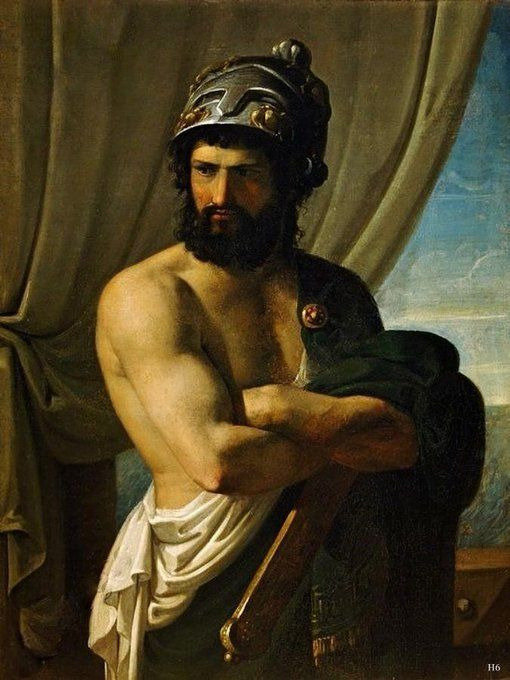
Odysseus (Roman Ulysses) was a mythical king of Ithaca who fought in the Trojan War. For 10 years Odysseus and the other Greeks stormed the lands of Troy, soaking its soil with blood and filling its air with the wails of mourning widows and mothers. Despite this, the walls of Troy held, its armies holding its own against the Greek horde. Eventually Odysseus came up with a way to crush Troy once and for all.
The Trojan Horse.

This was a giant hollow wooden horse that was presented to the enemy Trojans as a “peace offering”. Thinking that the Greeks had given up, the Trojans took the horse into Troy, where a massive party was held. However, after almost everyone passed out or went to bed…Greek soldiers poured out of the horse, eventually opening the city gates. The night shook with the collective battle cries of thousands of ferocious Greek warriors, who rushed into the city with murder in their eyes. Arrows and javelins crisscrossed in the air as houses were put to the torch and drunken Trojan soldiers were put to the sword. Civilians fared no better as the city came down, as the Sons of Greece howled in victory.

Odysseus was now a hero, a man admired by all the Greeks. He looked forward to going back home to Ithaca, to his wife Penelope and his son Telemachus. Their faces must have been on his mind as his ship sailed away from the Trojan shore, his battles now behind him.
Or so he thought…

On his way home, Odysseus stumbled upon an island that at first seemed just like that of any other in the Mediterranean region. However, after entering a cave filled with food, they soon discovered that the island was inhabited by cyclopes, one eyed giants with more attitude than a Pitbull that’s just been neutered.

One of these, Polyphemus, actually lived in the cave that Odysseus and his men had found. Enraged, Polyphemus kept them prisoner in the cave, eating several of them. Eventually, Odysseus decided to get Polyphemus drunk, where he would be vulnerable. As Polyphemus drank, he asked Odysseus his name. Odysseus lied, saying that his name was “Nobody” or “Noman” (depending on the translation). Once the brute succumbed to the wine, Odysseus and his men rammed a large, freshly made spear into Polyphemus’ eye. Polyphemus roared like a pride of lions, which prompted his oversized brothers to walk towards his cave, asking him what was going on. Remembering the name Odysseus gave him, Polyphemus became to Greek Mythology what Moe the Bartender is to the Simpsons:
“Noman is killing me by fraud;
no man is killing me by force.”

Hearing the term “Noman”, the other Cyclopes concluded that no one was hurting Polyphemus and that he was sick. Realizing that he’d been dumped, Polyphemus removed the stone door and stood at the opening of the cave, feeling around with his hands to make sure that none of the Greeks escaped. However, Odysseus looked at Polyphemus’s sheep, suddenly getting an idea. He and all his men got underneath the sheep, holding onto their fleece for dear life as the beasts crawled under the wrathful cyclops, who didn’t bother to check their undersides. Later, as Polyphemus tore the top of a mountain off and threw both it and a temper tantrum, Odysseus called out to him from his ship, revealing his true name.
Bad move.
You see, Polyphemus wasn’t just some run-of-the-mill fantasy monster; he was the son of Poseidon, wrathful god of the sea.
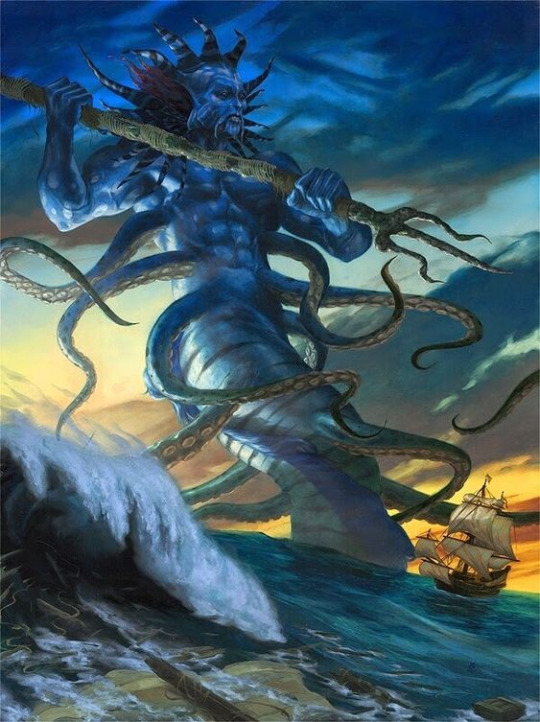
To avenge his son, Poseidon condemns Odysseus to wander the sea for ten years. During this time Odysseus has many adventures, encountering anything from ghosts and ogres to goddesses and sea monsters. Eventually, he reaches home, where he finds that dangerous men are putting pressure on his wife Penelope to marry one among them. Together with Telemachus, Odysseus slays them, regaining control of his homeland.
The story of Odysseus is one of the greatest tales of Greek Mythology. Odysseus is a thinking hero, one who uses his mind instead of brute force to tackle obstacles of every conceivable kind. He is no son of a god, but a man of mortal parents who braves both beasts and the divine in order to make his way home. But did his story inspire the creation of new gods? Indeed, was he the basis for Jesus Christ? Was Jesus a mythical figure based on this Greek hero?
Let’s see why this isn’t the case.
1. Incarnate God?
No, Odysseus was all mortal.
2. Son of God?
No, both his parents were mortal.
3. Trinity?
No, once again, he was a mortal man. He was not a god, let alone a person within a trinity.
4. Born of a virgin?
No, his parents had sex.

5. Star proclaimed his birth?
No.
6. Visited by wise men after his birth?
No.
7. Someone sought his death after he was born?
No.
8. Taught in a temple as a boy?
No.
9. Baptized?
No.
10. Tempted by the Devil?
No.
11. King?
Yes, Odysseus was a king. Jesus is too, though not of any earthly kingdom (John 18:36-37). He is the true King of the Jews (Isaiah 9:6-7, Matthew 2:2, Luke 23:3, John 1:49-50, 18:36-37) as well as the divine king (Revelation 19:16).
BTW: so, what? Are we going to say that Odysseus was based on Gilgamesh, Minos, Saul or Solomon, because they, like Odysseus, were also kings?
12. Carpenter?
Yes, just like Jesus…and countless other people throughout history, big deal. There were also a lot of kings. Once again… are we going to say that Odysseus was based on Gilgamesh, Minos, Saul or Solomon, because they, like Odysseus, were also kings?
13. Preacher?
No.
14. Prophet?
No.
15. Miracle worker?
No. Odysseus did eat a plant called Moly that made him immune to the Witch Goddess Circe’s powers, but this a far cry from performing a miracle. Was the Dread Pirate Roberts a miracle worker when he swallowed a magic pill that brought him back from being “mostly dead” in the movie “Princess Bride”?

Was Alice of “Alice in Wonderland” a miracle worker when she ate food that made her grow and drank a potion that made her shrink?

Ingesting a magic pill or magic food and potions doesn’t make them miracle workers, anymore than ingesting a real life pill makes a mechanic a doctor.

16. Multiplied bread and fish?
No, see above.
17. Walked on water?
No, see point 15 again.
18. Raised the dead?
No. Once again, point 15.
19. Healed the sick?
No. Once again, Point 15!
20. Cast out demons?
NO! POINT 15!!!!
21: Had supernatural enemies?
Oh wow! Supernatural enemies? That’s very hard to find in stories about heroes from both religious texts and myths!
I mean, that’s got to be so RARE!
Who would have thought?
Okay reader: time to do an eyeroll. Just get it out of your system, it helps when being exposed to Jesus Mythicist stupidity.

22. Had disciples?
No, he had soldiers, and they numbered far more than twelve (he had an army).
23. His “followers” acted Foolishly at times?
Yes, but once again, remember that Odysseus had soldiers, while Jesus had Disciples (meaning “students” in Greek).
24. Debated religious leaders of his day?
No.
25. Betrayed?
Odysseus was no stranger when it came to betrayal.
Once, when his last ship (the others being destroyed) reached the Island of the Sun God Helios, he made his crew swear not to kill any of Helios’ sacred cattle on the island. He had been warned by the ghost of the prophet Tiresias that if they killed them, then a catastrophe would occur. His men swore, but while Odysseus slept, Eurylochus, one of his soldiers, convinced the others to kill the cattle. Facing starvation, the men broke their vow. This ticked off Helios, which in turn ticked off Zeus, and…A storm at sea killed the rest of Odysseus’ men.
�� Odysseus was also betrayed by the suitors, men who wanted to marry Penelope. Their acts of rape and inhospitality was a stain on his honor. They had also tried to kill his son, and had even led some of his servant women to commit crimes against the state. Later, when he revealed himself to the suitors, Melanthius, one of his own goatherds, supplied them with weapons.
Jesus likewise was betrayed by Judas over thirty pieces of silver. A similarity…but not enough for Jesus Mythicists to make their case.
Indeed, how many people in the world have been betrayed?
26. Betrayer died soon after?
Eurylochus and the rest of Odysseus’ men died soon after killing Helios’ cattle. Likewise, Melanthius died soon after providing the suitors with weapons. However, both the suitors and the servant women carried out their betrayal for years before being stopped by Odysseus. Indeed, Melanthius had been allied with them for a while before the day when he gave them weapons to fight Ulysses.
27. Crucified?
No, Odysseus died of old age. In one version, he died defending his shepherds from Telegonus, his son by Circe. Telegonus afterwards learned that the man he killed was his father, who he had been searching for. In other versions he was exiled, in one dying of old age, in another his fate unknown. In the Odyssey, it indicates that his life will have a happy, fairy tale-style ending.
There is not one version where he is crucified.
Some Jesus Mythicists might state “but the story where he goes to Italy, one where his final fate is not known…he could have been crucified! It’s a possibility!!!”
Actually, no. You see, for one, such an argument would be an Appeal to Possibility, a logical fallacy where one tries to state that something is true because it is possible. Might as well say that he was mauled by a bear, because it’s possible, or hunted down by the Sirens because it is possible, or struck by Zeus’ thunderbolts because it’s possible, or clubbed to death by a prostitute in retaliation for him not paying her adequately enough because hey, its possible.
All of these possibilities hold the same amount of weight.
None.
Two, it’s also an Appeal to Ignorance fallacy, accepting something as true based on lack of evidence that shows otherwise. Imagine if someone not only claimed that a giant clone of Zooey Deschanel is in a secret underground government lab, but that, since this claim is not disproven, therefore it is true!

And three, it’s actually NOT possible, because the story of Odysseus existed before the invention of crucifixion. Crucifixion was invented in Persia in the 6th century BC. Homer’s Odyssey, on the other hand, was written about the 8th-7th century BC. True, Plutarch, who mentions the version of Odysseus going to exile in Italy, wrote in the second century, but let’s remember…he wrote in the second century. When was the New Testament written?
First century AD.
Now, you may be wondering where Jesus Mythicists got the idea that Odysseus was crucified.
Prepare to shake your head.
Odysseus once had to sail pass the isle of Anthemoessa, home of the Sirens. Sirens were singing sea nymphs who had the heads of women and the bodies of birds.
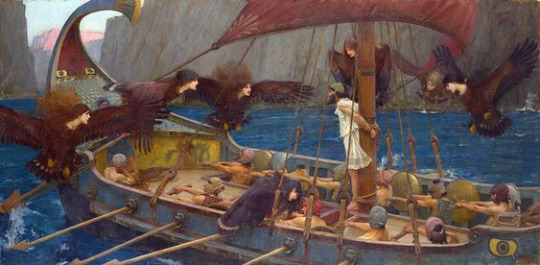
If you can imagine Katy Perry and a young Dolly Parton with the bodies of oversized eagles or hawks, you get an idea of what they would have been like.


However, their singing voices were even better than those of Parton or Perry. Indeed, their voices were enchanted, luring men toward Anthemoessa’s rocky shore. This led to a lot of ships sinking and a lot of men drowning, their bodies consumed by the Sirens. Wanting to avoid the same fate, Odysseus has his men stuff their ears with wax, which rendered them immune to the Siren’s allure. However, Odysseus had his men tie him to his ships mast, so that he could safely hear the sirens. Their song was so beautiful, so hypnotizing, that his men had to put stronger straps on him. After sailing to a safe distance, Odysseus was freed from the mast.
The following is an ancient Greek vase that depicts this mythological story:
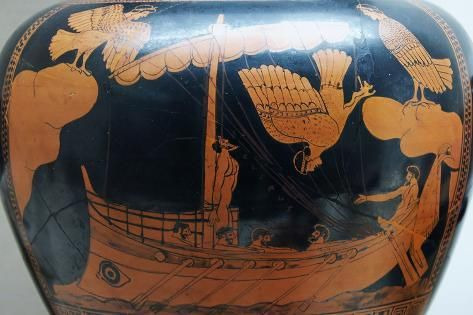
Here is a closer look:
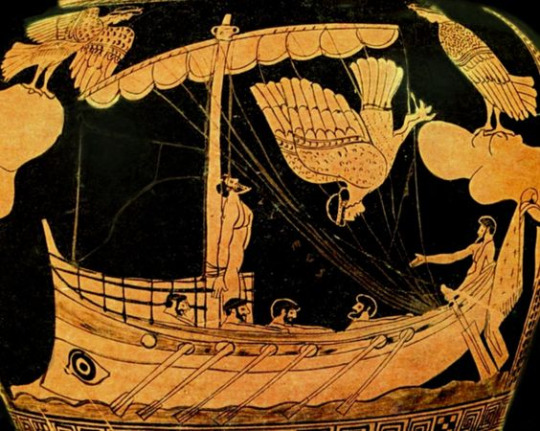
This is their proof that Odysseus was crucified.
Um…somebody forgot to tell them that being tied to a ship’s mas doesn’t = crucifixion.

Indeed, he wasn’t even being executed; he was simply being strapped down so that he could safely listen to the siren’s song.
Now, some Jesus Mythicists will try to point out similarities between these two events; Odysseus is strapped to a ship’s mast, which is both made of wood like a cross and with a similar shape to that of a cross (especially so with the sails rolled up), all the while standing straight up. Likewise, Jesus is nailed to a wooden cross, which is lifted straight up, Jesus body being vertical as well. Both are in anguish during this (Jesus due to pain, Odysseus due to not being able to go to the Sirens).
Parallel, right?
Wrong.

Crucifixion not only was a death penalty in Jesus’ time, but, as previously stated, it was being used to execute criminals since the 6th century BC. If the Gospel writers were making the story of Christ’s death up, why would they draw inspiration for the crucifixion from Odysseus being tied to a ship’s mast…instead of crucifixion itself, which was a common form of execution at the time? Remember, Odysseus wasn’t crucified; he was simply tied to a ship’s mast.
He…didn’t…die.
Now, some will counter this by saying that some ancient Christians made comparisons between Odysseus’ being tied to a mast and Jesus being crucified. However, this doesn’t mean that Christians were inspired by Odysseus’ tale to invent the crucifixion of Christ, any more than historians making comparisons between Alexander the Great and Achilles (both of whom share many parallels with each other) means that historians were inspired by Achilles to invent Alexander the Great. Andre the Giant, the late professional wrestler, bore many striking similarities with the mythic Hercules. If I note these similarities(which I did in another article, see the sources section below)...does it mean that I think that Andre the Giant didn’t therefore exist? No, it just means that I noted their similarities. I likewise wrote an article on the fem chatbot Tay, noting its striking similarities with Frankenstein’s monster (as well as with many other similar creatures in cinema, folklore and myth. See sources section below). Does that mean that I therefore think that Tay was a fictional character, not a real computer program? Anybody reading my article on Tay would know that wasn’t the case. Heck, people have compared the sinking of the Mignonette to “The Narrative of Arthur Gordon Pym of Nantucket” by Edgar Allan Poe, due to both also sharing many parallels (Poe’s novel predates it by decades). Does this mean that someone was inspired by Poe’s novel to invent the story of the Mignonette? Likewise, many have compared the Titanic disaster to the novella “Futility/Wreck of the Titan” by Morgan Robertson, both of which also share many parallels (Robertson’s book written 14 years before the Titanic was put to sea). Does this mean that someone was inspired by Robertson’s book to invent a fictitious Titanic?
Then why would Christians making a comparison between Jesus’ crucifixion and Odysseus being tied to a mast be evidence that Christians were inspired by the latter to come up with the former?

Keep in mind; the three examples I’ve cited above have FAR, FAR, FAR, FAR, FAR, FAR more parallels between them than Jesus’ crucifixion and Odysseus’ being tied to a mast have. Indeed, the similarities between Christ’s crucifixion and Odysseus being tied to a mast are far outweighed by the fact that one was a crucifixion and the other is not, one is an execution, the other an attempt to avoid death yet still hear the Siren’s song. One’s nailed to a cross to die for our sins, another is tied to a mast in order to both learn and survive a mystery.
Yep, they’re about as similar as Reese Witherspoon and Alice Cooper.


Folks, there is no crucifixion here, let alone something that inspired it.
28. Went to the Underworld?
Yes, Odysseus did, though he didn’t die in order to go there. He went there while still alive so that he could speak with Tiresias. After Jesus died, he went to the “heart of the earth” (meaning Hades (Old Testament “Sheol”), the abode of the dead) for three days (Matthew 12:40, Acts 2:27-31). One could say that they both went to Hades, due to the fact that the Hebrews borrowed the Greek name for the Underworld, replacing Sheol with it, but the differences in the story are far more startling than the similarities. Odysseus went to the Underworld while alive and left, while Jesus died, went there, and then resurrected.
29. Resurrected?
No, see points 27 and 28
30. Ascended into Heaven?
No.
31. Second coming?
Odysseus did return to Ithaca, just as Jesus will return one day to earth. However, Odysseus returned, while Jesus will return. There is not an enormous amount of theological significance to Odysseus returning to Ithaca as there is with Jesus returning to Earth. Its more akin to Robin Hood’s return from the Crusades than Jesus’ Second Coming.

33. Went in supernatural disguise?
After Odysseus returned to Ithaca, Athena disguised him as an old man, which allowed him to go unrecognized by the suitors. This was done to save his life; the suitors would have killed Odysseus if they saw him returning home. His true identity was later revealed when, out of all the suitors, only he was able to bend his own bow (one that he left in Ithaca before sailing off to the Trojan War) and firing an arrow through the heads of twelve axe handles. After this, both Odysseus and his son slew the suitors. Likewise, after Jesus resurrected, he encountered Mary Magdalene, who didn’t recognize him until he called her name (John 20:11-18). Later, he also encountered two other followers of his on the Road to Emmaus, neither of which recognized him at first, courtesy of divine power (Luke 24:13-16). After striking up a conversation with them, Jesus sat with them at dinner. As he blessed the bread, broke it and gave it to both, the men suddenly recognized who he was...only for Jesus to vanish (Luke 24:17-31). Just as Odysseus showed signs of who he was while disguised (i.e. stringing the bow and firing it through the twelve axes), Jesus showed his unparalled knowledge of the scriptures with the men on the road to Emmaus, who felt their hearts burn as he spoke (Luke 24:25-32).
Admittedly, there is a striking similarity between Odysseus and Jesus in this regard.
However...so what?
As I mentioned in point 27, there have been many occasions in history where a historical figure or event bore numerous striking parallels with myths or fictional tales. This isn’t evidence that the historicity of those individuals or events should be called into question. Whose going to deny the historical existence of the Titanic, Mignonette, Andre the Giant, Tay or Alexander the Great because they were prefigured by mythic or fictional accounts that bore striking similarities with them?
Indeed, with all the mythic characters and stories, with all the historical figures and events that have occurred in the world, one would expect that eventually, some historical figure or event would arise that would bear parallels with mythical figures and tales, or vice versa.
This isn’t evidence of borrowing or inspiration.
Its evidence of math.
And, as we’ve already seen in most of the other points, Odysseus and Jesus really don’t parallel each other that well.
Indeed, they mostly don’t parallel at all.
34. Reign in a future age?
No, he reigned on earth in the remote past.
The connection between Jesus and Odysseus is spurious, and yet people still promote the idea. Indeed, Dennis R. Macdonald, a scholar who wrote “The Homeric Epics and the Gospel of Mark”, not only claims in his book that much of Jesus’ story is derived from that of Odysseus, but also from other elements found in Homer’s works. Indeed, he even claims that the story of Jesus walking on water was derived from Homeric stories of Hermes…flying over water.
I’m not making this up. He actually wrote this.

He also wrote that the story of Jesus death was partially inspired by the death of Hector in the Iliad (who was slain by Achilles in battle, not crucified), and that John the Baptist’s death was inspired by myth of King Agamemnon’s death! Now, let’s look at that last one, shall we? Agamemnon was killed by his wife Queen Clytemnestra and her lover Aegisthus (some accounts its Aegisthus and twenty other men). In some ancient sources, he was killed while taking a bath. In one version, Clytemnestra threw a net on him and then twisted it, before Aegisthus swung his sword or axe (in the version where her lover has a sword, Clytemnestra strikes Agamemnon with the axe afterwards). In another version of the death-while-bathing myth, Agamemnon is wearing a shirt with sleeves that are sown up, which likewise renders him helpless against the axe). Other sources state that he was killed while sitting at a table. The only similarities between his death and that of John the Baptist is that they were killed by royalty (Aegisthus ruled Mycenae) and they were both beheaded. An interesting parallel…until you realize that beheading was a form of punishment in ancient Greece and Rome and that kings could and did command that some people be beheaded. I could also mention that Herod Antipas, who had John the Baptist beheaded, was not actually a king, bur a Tetrarch, a ruler over a quarter of a province or region (the Romans also used it to refer to someone who ruled over any portion of the empire). Though the author of the Gospel of Mark used the term “king” for Herod Antipas, he was either using the word loosely, or being sarcastic. Indeed, his wife Herodias planned to make him a real king. When Herod Antipas appealed for the title of king, he was rewarded by the Romans with exile to Gaul. Thus, he wasn’t royalty.
And yet…Agamemnon’s death was supposed to be the basis for that of John the Baptist…
Just as Odysseus was supposed to be the basis for Jesus…
Can you say “WRONG”?

Folks, Jesus wasn’t based or even inspired by Odysseus, let alone Homer’s Odyssey or Iliad. Jesus is a historical figure, not a mythical figure. Jesus is real, not a figment of Homeric tales.
Jesus is the real deal.

Sources:
“The Odyssey” by Homer (Translated by Samuel Butler), 87-96, 110-111, 122-30, 177-78, 226-35
https://www.theoi.com/Text/HomerOdyssey9.html
https://www.theoi.com/Text/HomerOdyssey22.html
“The Ultimate Encyclopedia of Mythology” by Arthur Cotterell and Rachel Storm, 17, 19-20, 34, 60, 66-67, 74, 76, 78-79, 88
“The Penguin Dictionary of Classical Mythology” by Pierre Grimal, 19-20, 25-27, 300-06
https://www.blueletterbible.org/faq/don_stewart/don_stewart_1336.cfm
“Homer's Odyssey and the Near East” By Bruce Louden, 277
https://www.google.com/books/edition/Homer_s_Odyssey_and_the_Near_East/AKDfiWrXAx8C?hl=en&gbpv=1&dq=Suitors%2BBetrayed%2BOdysseus&pg=PA277&printsec=frontcover
“Women, Crime and Punishment in Ancient Law and Society Volume 2: Ancient Greece” By Elisabeth Meier Tetlow, 25
https://www.google.com/books/edition/Women_Crime_and_Punishment_in_Ancient_La/3fnsWhZkq74C?hl=en&gbpv=1&dq=Suitors%2BBetrayed%2BOdysseus&pg=PA25&printsec=frontcover
https://www.historic-uk.com/HistoryUK/HistoryofEngland/Robin-Hood/
https://www.theoi.com/Pontios/Seirenes.html
“Jesus, Paul, and Power Rhetoric, Ritual, and Metaphor in Ancient Mediterranean Christianity” By Rick F. Talbott and S. Scott Bartchy, 143
https://www.google.com/books/edition/Jesus_Paul_and_Power/yxJTAwAAQBAJ?hl=en&gbpv=1&dq=Odysseus%2BMast%2BJesus%2Bcrucified&pg=PA143&printsec=frontcover
https://sirtravisjacksonoftexas.tumblr.com/post/628287347439665153/alexander-the-great-and-achilles-examining-the
https://sirtravisjacksonoftexas.tumblr.com/post/628113211750776832/do-supposed-parallels-between-the-gospels-and
https://www.britannica.com/topic/crucifixion-capital-punishment
https://www.britannica.com/topic/Odyssey-epic-by-Homer
https://www.ancient.eu/odysseus/
https://bmcr.brynmawr.edu/2000/2000.09.16/
https://www.logicallyfallacious.com/logicalfallacies/Argument-from-Ignorance
https://www.logicallyfallacious.com/logicalfallacies/Appeal-to-Possibility
“Encyclopedia of Women in the Ancient World” By Joyce E. Salisbury, 66
https://www.google.com/books/edition/Encyclopedia_of_Women_in_the_Ancient_Wor/HF0m3spOebcC?hl=en&gbpv=1&dq=Agamemnon%2Bbeheaded&pg=PA66&printsec=frontcover
https://www.newworldencyclopedia.org/entry/Beheading
https://www.britannica.com/topic/beheading
https://www.google.com/books/edition/Mortal_Republic/P2RPDwAAQBAJ?hl=en&gbpv=1&dq=Pompey+beheaded&pg=PT206&printsec=frontcover
“The IVP Bible Background Commentary: New Testament” by Craig S. Keener, 85, 150-51.
https://www.livius.org/articles/person/herod-antipas/
“Bible Understanding Made Easy: Volume 3: Mark’s Gospel” By Anthony L. Norwood, 23
https://books.google.com/books?id=g2DkENMbNnoC&newbks=0&printsec=frontcover&pg=PA23&dq=tetrarch+roman+empire&hl=en&source=newbks_fb#v=onepage&q=tetrarch%20roman%20empire&f=false
https://www.britannica.com/topic/tetrarch-ancient-Greek-official
“Clash of the Gods” documentary series: “Odysseus: Curse of the Sea” and “Odysseus: Warrior’s Revenge” episodes
“The Portable Seminary: A Master’s Level Overview In One Volume”” by David Horton (General Editor), 281
“Quaestiones Graecae” (The Greek Questions) by Plutarch, section 14
http://www.perseus.tufts.edu/hopper/text?doc=Perseus%3Atext%3A2008.01.0215%3Asection%3D14
http://www.perseus.tufts.edu/hopper/text?doc=Perseus%3Atext%3A2008.01.0215
https://sirtravisjacksonoftexas.tumblr.com/post/615781564580773888/was-jesus-a-fictional-character-based-on-pagan
https://sirtravisjacksonoftexas.tumblr.com/post/624904287995265024/do-so-called-similarities-between-jesus-and
“The Princess Bride” film
“Alice in Wonderland” Disney cartoon.
0 notes